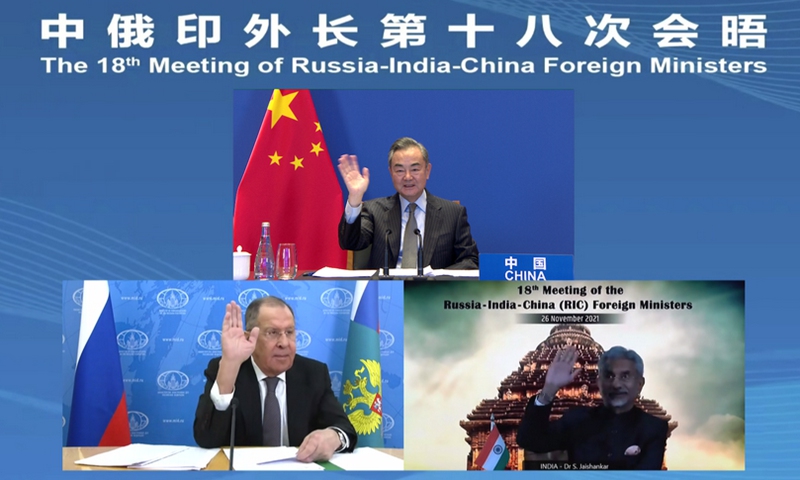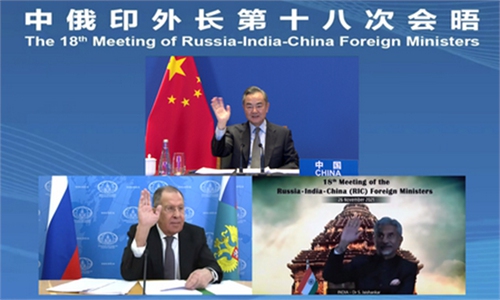
Photo:Ministry of Foreign Affairs
The 18th Meeting of the Foreign Ministers of China, Russia and India was held on Friday via video link. The line in the ensuing joint communiqué that "the Ministers expressed their support to China to host Beijing 2022 Winter Olympic and Paralympic Games" has drawn wide attention.The US and some of its allies such as the UK and Australia are considering a "diplomatic boycott" of the Beijing Winter Olympic Games. New Delhi in recent years is moving closer toward Washington in terms of geopolitics, and is hostile toward Beijing over some issues. Against this backdrop, India's support for the Beijing 2022 Winter Olympic Games has surprised some netizens at home and abroad.
Apart from the Beijing 2022 Winter Olympic Games, the joint communiqué also mentions consensus in other fields among the three foreign ministers. For example, in regard to the COVID-19 pandemic, they reiterated "the need for continued cooperation in this fight inter-alia through sharing of vaccine doses, transfer of technology, development of local production capacities [and] promotion of supply chains for medical products." They agreed that cooperation between China, Russia and India will "contribute not only to their own growth but also to global peace, security, stability and development." Furthermore, they called for "immediate and unhindered humanitarian assistance to be provided to Afghanistan."
This fully demonstrates that although border disputes between China and India continue to exist, they are not the whole of the bilateral relations. Both sides have many common interests across various domains. The two countries can strive to prevent conflicts from affecting their cooperation as they did before 2020.
India's behavior toward the Beijing 2022 Winter Olympic Games embodies that New Delhi retains its strong diplomatic and strategic autonomy. Despite its close ties with the US, India does not mean that it inclines to the US over all regional and international affairs. New Delhi is simply not a "natural ally" of Washington.
India has strengthened its collaboration with the US, as well as its allies such as Japan and Australia, while India's cooperation with China, Russia, other members of the Shanghai Cooperation Organisation and BRICS continues as well. It shows that in diplomacy, India seeks to move flexibly among major powers and various mechanisms in a bid to maximize its diplomatic maneuvering space.
"India sends a positive signal to the outside world that India will try to manage the frictions with China, and the bilateral relations tend to stabilize after the deterioration over a period," Qian Feng, director of the research department at the National Strategy Institute at Tsinghua University, told the Global Times. "But to return to the situation before the current deadlock, more efforts and patience are needed. The two sides have to address their challenges through more dialogues and consultations."
"Washington's attempts to rope in New Delhi will not cease because of the latter's attitude toward the Beijing 2022 Winter Olympic Games. The US' strategy is to contest against China and Russia and the US has always seen India as a chip to mount its rivalry with China and Russia."
But India's stance on the Beijing Winter Olympic Games and other contents of the joint communiqué have further clarified that India will not become a US ally or another "little brother" like Japan or Australia. India has a dream to become a great power itself and will be reluctant to be attached to the US.

